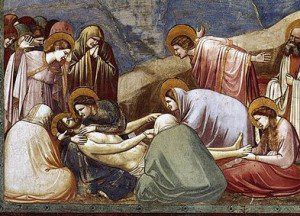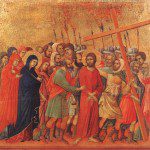
Last night I was vague because I didn’t want to divulge anything that was meant to be private, but today it seems to be common knowledge, so I can say a little more. My friend and fellow Patheos blogger, Leticia Adams, lost her oldest son to suicide. He’d been struggling with depression. Yesterday, unexpectedly, he died of his illness. We commend him to the mercy of God with great confidence.
This isn’t the only death I’m reeling from right now. I’ve been wanting to write about the others, but I didn’t know how. Another friend lost her husband last month. It was a long, agonizing battle with pancreatic cancer, and the hospice failed at making him comfortable in the end. His wife told me she wished people understood what death from cancer was really like–that it’s nothing like the way it’s portrayed in Hollywood. It’s terrifying, it’s slow, “and it involves poop.” He was afraid to die– he told his wife he was afraid to leave her. In the end, he couldn’t speak but only groaned. He struggled, and then he was gone.
We commend him to the mercy of God with great confidence.
A few weeks ago, here in town, the friendliest driver on our small city bus route passed away. I assume his real name wasn’t “Chico,” but that was what everyone called him. Chico was the driver they featured in all their advertisements because he was the one who knew how to smile and act like he meant it. He was the driver that nobody complained about; he showed up on time, knew people by name, and never had a nasty word to say about anybody. Once or twice he drove the bus right off of his usual route to drop me off at my door if it was raining. When the bus company donated a life-sized nutcracker to the city’s annual Nutcracker Village display, they had it painted in Chico’s likeness. He was everyone’s favorite.
They found him and his wife in their house, dead of carbon monoxide poisoning. The dog and the pet bird somehow survived, but Chico and his wife were gone.
We commend them to the mercy of God with great confidence.
It takes great confidence to talk about the mercy of God, when you catch a glimpse of what death is like. It takes confidence that seems like naivete, confidence bordering on insanity.
Death is a mystery and a terrible mystery. It’s something that our Lord didn’t want. It’s the thing that entered creation with the serpent, with disobedience, with our first parents’ choice to know what evil was like by doing it. It isn’t sweet. It isn’t merciful. It’s a dark and dreadful thing, a thing we can’t understand because it makes no sense. It’s with us every day– we all know that we’re going to die. We should be used to it, but we’re not, and that is right and just, because death is more than we can comprehend. It is something that shouldn’t be there, and yet it always is.
No amount of sugar-coating, no platitudes or hollow words of comfort can take the shock and bitterness away. Death is shocking and bitter. It involves filth and groaning and struggle; it involves trauma. It involves waking up one morning to find that someone who ought to still be here is gone. It involves standing at the foot of the cross with nothing to say, to the dying or to the survivors, that could make it even a little bit less painful.
As I’ve mentioned on this blog before, Christ did not become incarnate and die so that we could see that death wasn’t so bad after all. He did it so that He could be present with us, in the most terrible mystery we would have to endure.
He did it so that, when that Terrible Mystery comes to claim us, we will find Him suffering with us.
He did it so that He could rise from the dead, rendering the Terrible Mystery impermanent.
By death, He trampled death. By death, He gives us the promise that death itself has an end. Someday, the Terrible Mystery itself will be gone forever, and we who slept in Him will be alive again. Someday, it will be good that we lived, even though we lived in the shadow of the Terrible Mystery and even thought the Terrible Mystery claimed our earthly lives. This we know by faith, and by this faith we commend ourselves to the mercy of God with great confidence.
With this great confidence, we live, even here in the shadow of the Terrible Mystery.
In this great confidence, we commend the souls of the dead to the Father, for the day when the Terrible Mystery is no more. For the day when the graves give up their relics, the tears are dried, the traumas healed and every mystery brought into the light.
We cannot comprehend the Terrible Mystery. We cannot make it go away; we cannot make it not terrible anymore. But we can place our confidence in the One who is stronger than death. Into His hands we commend our spirits, with great confidence.
If anyone wishes to help Leticia’s family financially during this time, details for doing so can be found here.
(Image via Wikimedia Commons)












